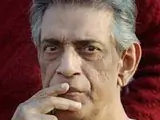1.Stanely Kubrick
2.Martin Scorsese
3.Ingmar Bergman
4.David Lynch
5.Akira Kurosawa
6.Yashiro Ozu
7.Luis Bunuel
8.Satyajit Ray
9.Paul Thomas Anderson
10.Rober Altman
Martin Scorsese, Film Director
" Ray's magic, the simple poetry of his images and their emotional impact, will always stay with me."
"We would like to bring to your attention, and to the attention of the distinguished board of directors of the Academy, a master filmmaker, Satyajit Ray... Though somewhat unwell, during the past few years he has completed two additional films, centered around his deeply humanitarian vision. His work is in the company of that of living contemporaries like Ingmar Bergman, Akira Kurosawa and Federico Fellini."
(Nominating Ray for Life Time Achievement Oscar, 1991)
"I was in high school and I happened to see 'Pather Panchali' on television. Dubbed in English. With commercials. "It didn't matter. It didn't matter. The image of the Indian culture we had had before, and I'm talking I was 14 years old or 15 years old, were usually through colonialist eyes. And when Satyajit Ray did his films you suddenly not understood the culture because the culture was so complex but you became attached to the culture through the people, and it didn't matter what they were speaking, what they were wearing, what their customs were. Their customs were very, very interesting and surprising, and you suddenly began to realize there are other cultures in the world."
Pauline Kael, Film Critic (I Lost It At The Movies, 1965)
"Like Renoir and DeSica, Ray sees that life itself is good no matter how bad it is. It is difficult to discuss art which is an affirmation of life, without fear of becoming maudlin. But is there any other kind of art, on screen or elsewhere? "In cinema," Ray says, "we must select everything for the camera according to the richness of its power to reveal."
Ray is sometimes (for us Westerners, and perhaps for Easterners also?) a little boring, but what major artist outside film and drama isn't? What he has to give us is so rich, so contemplative in approach (and this we are completely unused to in the film medium - except perhaps in documentary), that we begin to accept out lapses of attention during the tedious moments with the same kind of relaxation and confidence and affection that we feel for the boring sketches in the great novels, the epic poems."






























64